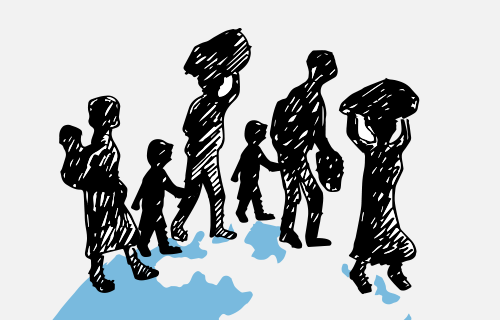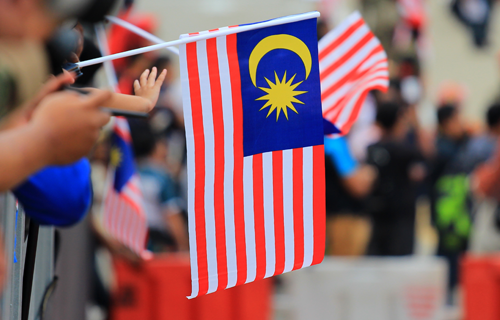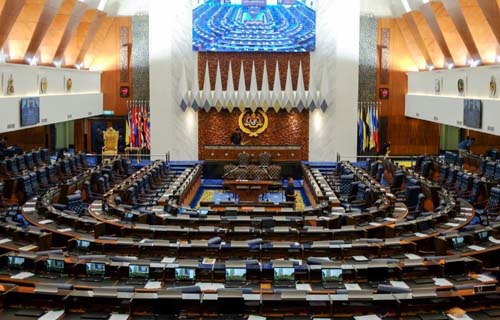Commemorating World Refugee Day

Written by YAM Tunku Zain Al-‘Abidin ibni Tuanku Muhriz, Founding President of the Institute for Democracy and Economic Affairs (IDEAS).
Changing attitudes, and policies too, are necessary in providing employment and education rights to empower migrants.
IT has been a natural phenomenon for millennia that people move from place to place: throughout history, migration has been encouraged or forced due to political, economic, social and increasingly, environmental reasons.
Today we see violent protests in the United States taking place between factions with different views of migration – ostensibly anyway, since many theorise that violence is being deliberately fomented to justify further authoritarian rule while creating distractions from other events in US domestic politics.
Meanwhile in Palestine, forced displacement amid violence occurs every day, and foreign aid is extremely regulated.
The Madleen flotilla, which was intercepted by Israeli forces, encountered and saved several Sudanese war refugees who had fled violence and persecution in their home country, only to be met with further detention and torture in another country.
This chain of suffering reminds us that displacement is often a prolonged, recurring trauma.
But how should we in Malaysia commemorate World Refugee Day?
We are not a signatory to the 1951 Refugee Convention, and consistency is not one of our strong point points. At worst, refugees and migrants have been invoked by Malaysian politicians as soundbites to garner domestic political support, without changing any policies whatsoever.
Unfortunately, such statements can increase xenophobia by giving the false impression that the government is favouring certain communities.
Thus, in recent years, we have seen TikTok videos of Rohingya men being assaulted, even in mosques.
On occasion, where you have sustained pressure from humanitarians or a sympathetic minister, we have authorities turning a blind eye in applying repressive measures, so families can survive and breadwinners can work in the grey economy.
One well-known example of a more concrete effort was how UNHCR worked with the Malaysian government to give shelter for the Vietnamese boat people of the 1970s and 80s (some of whom I have met and still express gratitude to Malaysia for saving their lives).
At best, policies actually are pursued and resources committed, as for the victims of the Yugoslav Wars of the 1990s which resulted in a generation of Bosnian policymakers, professionals and entrepreneurs educated in Malaysia, who continue to contribute to the bilateral relationship economically, academically and even gastronomically.
But increased recognition will hopefully permanently improve policymaking.
The resilience of Malaysian civil society ensures that refugee issues will always be on the agenda, with social media becoming an important platform to sustain visibility.
Significantly, the establishment of the All-Party Parliamentary Group on Refugee Policy means that there is an interface between advocates, academics, practitioners and policymakers.
The resulting cross-party cooperation based on data as well as shared humanitarian concerns is most encouraging. This in turn endows confidence to others working with the community.
Several schools now openly operate with refugee children in attendance.
Ideas International School is one, and I was pleased to accompany The Greatest Love of All on piano with the choir at our graduation ceremony recently.
The fact that Malaysian parents want to send their kids to our school – to sit in the same classrooms as refugees – marks a significant change in attitudes too.
Apart from education, dignity also means healthcare and the right to work.
These three pillars were identified in the Institute for Democracy and Economic Affairs’ (Ideas) Covid-19 report on refugees as critical for preventing long-term trauma and social exclusion.
In 2019, we estimated the economic benefits of providing employment rights to refugees: providing all refugees with access to formal employment was estimated to deliver an additional RM3bil to GDP and an extra RM50mil in tax revenue annually.
Additionally, providing refugee students with equal access to education was estimated as generating over RM6.5bil in GDP and RM250mil in taxes annually by 2040.
Ideas is working towards updating these estimates, but there are of course human and social benefits of equal or greater value that are much harder to quantify.
In the meantime, Ideas is also joining hands with the Malaysian Advisory Group on Myanmar, which has taken the lead in hosting roundtables to explore themes such as federalism, women’s rights and elections.
These boost knowledge and enable collaboration between stakeholders in addressing the multi-faceted crisis. Indeed it is vital to assemble a range of voices, from frontline health providers, refugee rights advocates and digital content regulators, for each plays an important role in this ecosystem of dignity.
In this way, we can cohesively explore the intersections of healthcare, refugee rights, policy, and digital content moderation.
Supporting refugee entrepreneurs – such as the Thimble Collective, Mang Tha and the Rohingya Women Development Network – is another way to empower the community.
They are not merely passive recipients of aid, but creators in their own right.
Edited from the writer’s opening remarks at the World Refugee Day event organised by Medecins Sans Frontieres Malaysia on June 10. The views expressed here are the writer’s own.
This article was featured in The Star
The views expressed in this article are solely those of the authors and do not necessarily represent the views or positions of IDEAS Malaysia. All opinions are the author’s own.


